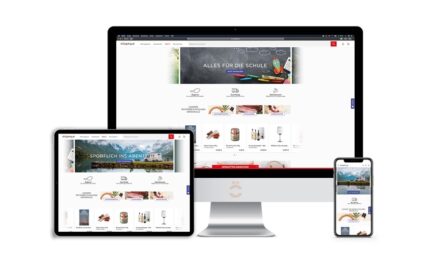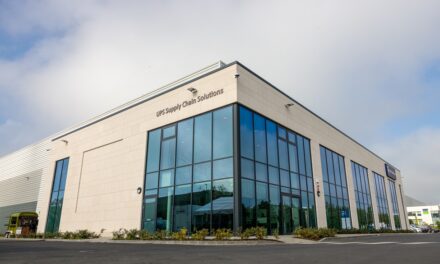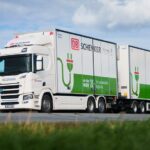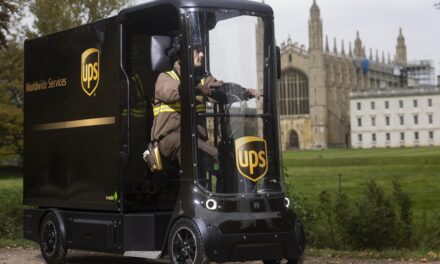
UPS first in industry to purchase hydraulic hybrid vehicles
As part of a public-private partnership to increase the commercial availability and use of alternative fuel vehicles, UPS announced its first purchases of a little-known technology – the hydraulic hybrid vehicle – that promises dramatic fuel savings and environmental benefits.
The technology, originally developed in a federal laboratory of the Environmental Protection Agency, stores energy by compressing hydraulic fluid under pressure in a large chamber.
Disclosing the results of its road testing on Detroit routes for the first time, UPS and the U.S. Environmental Protection Agency (EPA) said the prototype vehicle had achieved a 45-to-50 percent improvement in fuel economy compared to conventional diesel delivery trucks. UPS believes similar fuel economy improvements and a 30 percent reduction in CO2 are achievable in daily, real-world use. The EPA believes the technology can perform equally well in other applications such as shuttle and transit buses and refuse pick-up trucks.
UPS will deploy the first two of the new HHV’s in Minneapolis during the first quarter of 2009.
UPS’s current “green fleet” totals more than 1,600 low-carbon vehicles, including all-electric, hybrid electric, compressed natural gas (CNG), liquefied natural gas (LNG) and propane-powered trucks.
As part of a public-private partnership to increase the commercial availability and use of alternative fuel vehicles, UPS announced its first purchases of a little-known technology – the hydraulic hybrid vehicle – that promises dramatic fuel savings and environmental benefits.
The technology, originally developed in a federal laboratory of the Environmental Protection Agency, stores energy by compressing hydraulic fluid under pressure in a large chamber. UPS was the only company in its industry asked to road-test the technology two years ago and now becomes the first delivery company to place an order for hydraulic hybrid vehicles (HHV).
Disclosing the results of its road testing on Detroit routes for the first time, UPS and the U.S. Environmental Protection Agency (EPA) said the prototype vehicle had achieved a 45-to-50 percent improvement in fuel economy compared to conventional diesel delivery trucks. UPS believes similar fuel economy improvements and a 30 percent reduction in CO2 are achievable in daily, real-world use. The EPA believes the technology can perform equally well in other applications such as shuttle and transit buses and refuse pick-up trucks.
UPS will deploy the first two of the new HHV’s in Minneapolis during the first quarter of 2009. Eaton, which helped develop and refine the vehicle’s hydraulic hybrid power system, will monitor the vehicle’s fuel economy performance and emissions in the Minneapolis area. The additional five HHV’s will be deployed later in 2009 and early 2010.
With a diesel “series” hydraulic hybrid of the type being purchased by UPS, a high-efficiency diesel engine is combined with a unique hydraulic propulsion system, replacing the conventional drivetrain and transmission. The vehicle uses hydraulic pumps and hydraulic storage tanks to capture and store energy, similar to what is done with electric motors and batteries in a hybrid electric vehicle. In this case, the diesel engine is used to periodically recharge pressure in the hydraulic propulsion system. Fuel economy is increased in three ways: vehicle braking energy is recovered that normally is wasted; the engine is operated more efficiently, and the engine can be shut off when stopped or decelerating.
UPS’s current “green fleet” totals more than 1,600 low-carbon vehicles, including all-electric, hybrid electric, compressed natural gas (CNG), liquefied natural gas (LNG) and propane-powered trucks.
In addition to the hydraulic hybrid, UPS has road-tested hydrogen fuel cell delivery trucks. UPS began deploying alternative fuel vehicles in the 1930’s with a fleet of electric trucks in New York City.
The HHV vehicle order follows the May 2008 purchase of 500 hybrid electric and CNG vehicles and the April 2008 deployment of 167 new CNG vehicles in Atlanta, Dallas, Los Angeles, Ontario, San Ramon, Fresno and Sacramento. With UPS’s new purchases, the company’s “green fleet,” already the largest private fleet in the transportation industry, will total more than 2,100 vehicles.













